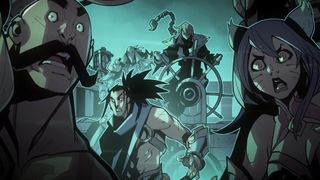
This week, employees at League of Legends studio Riot Games became the latest developers to be hit by the unprecedented wave of layoffs sweeping across the industry. 530 people, or around 11% of Riot's total staff, have been affected by the 'necessity' of cost-cutting efforts with the aim of "honing in" on Riot's core games portfolio.
The two most apparent casualties of those layoffs are, by Riot's own admission, in its card game Legends of Runeterra, and in Riot Forge, its indie publishing arm. Founded in 2019, Forge's aim was to work with acclaimed indie developers to allow them to make single-player games that would expand the League of Legends universe. Its debut games were Hextech Mayhem, a chaotic rhythm game from the Bitrunner devs, and Ruined King, a sprawling, hugely detailed RPG that was presented alongside the story of the in-universe Ruination event.
After that came Convergence, a time-winding Metroidvania starring many members of the cast of Netflix's Arcane, and The Mageseeker, from the developers of acclaimed roguelike Moonlighter and anticipated RTS Cataclismo. More recently was Song of Nunu, an adventure game from the creators of Rime that boasts 'overwhelmingly positive' reviews on Steam. Riot Forge's final game, Bandle Tale, is a crafting sim from the team behind cult classic Graveyard Keeper.
Forge freezes over
Critically, Riot Forge has been a success. All of its games boast impressive Steam scores, and it's a similar story on Metacritic. All come from indie developers with genuine pedigree. Narratively, the majority are tied directly into long-running in-universe stories that have long since captured players' imaginations. You could hardly accuse Riot Forge of failing to live up to its original mission statement.
But in spite of all of those successes, Forge seemed to me to fail critically in one important aspect: marketing. For a series of League of Legends games to have passed by the general populace is perhaps understandable, but it often felt as though Riot's own community had little knowledge of Forge's existence, let alone what it was working on. As a result, those projects struggled to get into the eyelines - and the wallets - of the very people they were laser-targeted towards.

There are probably many factors at play there. Forge was always stuck between the League of Legends community's affinity for competitive multiplayer games and the general populace's relative lack of interest in a single-player League of Legends experience. Arcane managed to circumvent that particular issue, but it was Netflix, not LoL, that allowed it to become the exception to the rule. But Riot's also been extremely risk-averse when it comes to marketing its games: The Mageseeker was only announced in a sizzle reel that focused on two other games; Ruined King didn't launch alongside the in-game event based around its story, but months later; and some players say they weren't even aware that games starring their favorite characters had ever released. One might argue that Riot, the studio behind a global mega-hit that still boasts millions of monthly players and maintains one of the biggest audiences on Twitch, doesn't really need to advertise, but I don't think that applies to small-scale spin-offs.
Even from my own specific experience as a journalist, Forge seemed to stumble. Repeatedly, I watched as Riot offered up review copies for its games extremely late. In many cases, when a game is coming into reviewers that hot, it's a sign of poor quality. But that's never been the case with Forge games, so not only does that strategy not add up, it's actively counter-productive. Late review copies increase the likelihood that a game doesn't get reviewed by a specific outlet, especially in the case of games, like these, set in a franchise that doesn't get widespread coverage. League of Legends might not really benefit from that coverage, but indie games do, and Riot appeared to leave those opportunities on the table.
Sign up to the GamesRadar+ Newsletter
Weekly digests, tales from the communities you love, and more
In the end, it's a case of wasted potential. Riot Forge was, of course, a commercial venture, and as such it existed to help make money. But it also felt like an attempt to do something that didn't feel entirely self-serving - Riot didn't need to produce any spin-offs, but it chose to invest into the indie scene, propelling and funding studios to make games that would directly serve its audience. And that attempt was successful, at least for a while, and at times in apparent spite of Riot's marketing efforts. Forge was something rare in this industry – name another major developer repeatedly working with indie teams to create heartfelt spin-offs within its own IP – and its loss is the culmination of a missed opportunity to have done a whole lot more.

I'm GamesRadar's news editor, working with the team to deliver breaking news from across the industry. I started my journalistic career while getting my degree in English Literature at the University of Warwick, where I also worked as Games Editor on the student newspaper, The Boar. Since then, I've run the news sections at PCGamesN and Kotaku UK, and also regularly contributed to PC Gamer. As you might be able to tell, PC is my platform of choice, so you can regularly find me playing League of Legends or Steam's latest indie hit.

My next Metroidvania kick is an ingenious mix of Zelda-like exploration, twin-stick combat, and pitch-perfect controls – with 97% positive Steam user reviews

Wait a minute, Bandai's latest anime game actually looks pretty good: a console and PC action-RPG city builder based on one of the best video gamey anime in years
Most Popular



